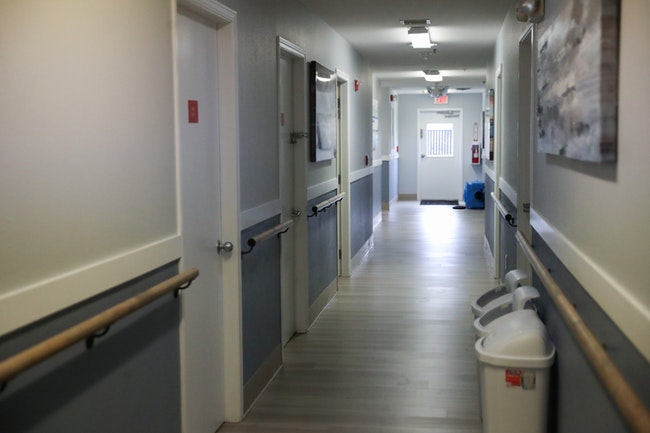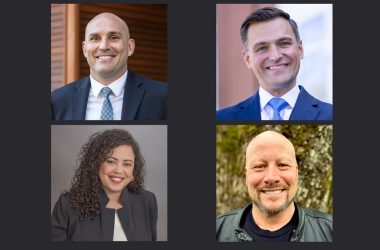
A hallway leads to patient bedrooms for the medically managed withdrawal program at Bridgeway, where patients can detox from drugs and alcohol, on Thursday, Jan. 28. (Amanda Loman/Salem Reporter)
People exiting the prison system in Salem will have extra help staying off drugs thanks to a grant intended to assist local organizations implement a sweeping change to Oregon’s drug laws passed by voters last year.
As part of Measure 110, which aims to steer drug users toward clinics instead of incarceration, Bridgeway Recovery Services was awarded $126,682 in the first round of a competitive state grant process by the Oregon Health Authority and state Department of Human Services.
Tim Murphy, CEO of Bridgeway Recovery Services, said the money will fund two peer recovery specialists who have lived experience in the mental health or substance abuse treatment systems.
He said the specialists will build relationships with people who are leaving prison, helping them navigate their reentry and encouraging them to enter substance abuse treatment.
“They are more likely to live sober and not recidivate,” he said.
Murphy said Bridgeway is specifically looking for bilingual and bicultural peer recovery specialists to target the Hispanic community, which he said is underrepresented in treatment.
In collaboration with Salem Hospital, Bridgeway will have another half-time position that will help Spanish-speakers who enter the emergency room with a substance abuse issue. That position will help patients transition to outpatient treatment.
Murphy said Bridgeway has bicultural, bilingual counselors but there aren’t a lot of peer recovery specialists that meet that criteria. Because of the position’s unique qualifications, he said recruitment will take a while and those positions will likely start in the fall.
“We’re really excited about it,” he said. “It’s a service that’s much needed in our community.”
There was $20 million distributed with 20% going specifically to tribes. The Grand Ronde Tribe was awarded $590,055.
The tribe is using the money to hire two peer support counselors for its new medication-assisted treatment clinic in Salem called Great Circle Recovery and three counselors in Grand Ronde.
The money will also pay for recovery housing in the Grand Ronde area for tribal members and a shuttle that will transport clients to and from the medication-assisted treatment clinic in Salem, which helps people with opioid addiction, according to the grant application.
Funding was awarded to 48 nonprofits and governmental entities out of 114 grant proposals.
“This initial $20 million will help providers serve some of the most vulnerable people in our community,” said Tera Hurst, executive director of the Health Justice Recovery Alliance, in a statement.
“The initial grant process highlights what many of us already knew: that there is a desperate need for more investment in addiction recovery and harm reduction services — especially for programs that are culturally and linguistically specific. We have a long way to go toward meeting the need, but this initial round of funding can give hope and shows the commitment of the legislature to invest in these life saving services.”
Another $6.4 million went toward grant extensions to addiction recovery and harm reduction providers already contracted with the state and $8.9 million in grants for proposals that aligned with the goals of Measure 110.
Contact reporter Saphara Harrell at 503-549-6250, [email protected].
JUST THE FACTS, FOR SALEM – We report on your community with care and depth, fairness and accuracy. Get local news that matters to you. Subscribe to Salem Reporter starting at $5 a month. Click I want to subscribe!









